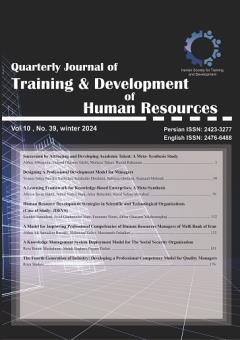Presenting a model in order to improve the professional qualification of human resources managers of National Bank of Iran
Subject Areas :Abbasali Samadianbarzaki 1 , mahmoud safari 2 , Masome Oladian 3
1 - noPhD student in Educational Management, Islamic Azad University, Damavand Branch, Damavand, Iran.
2 - noAssistant Professor, Islamic Azad University, Damavand Branch (Tehran), Department of Educational Sciences, Tehran, Iran
3 - noAssistant Professor, Islamic Azad University, Damavand Branch (Tehran), Department of Educational Sciences, Tehran, Iran
Keywords: Qualification, professional qualification, Human resource managers , National Bank.,
Abstract :
The current research is designing a model to improve the professional qualification of human resources managers of the National Bank of Iran. The method of this research is practical in terms of purpose and it was done by mixed-exploratory (qualitative-quantitative) method. The statistical population in the qualitative section included senior managers of human resources and professional academic experts. Data collection was done through semi-structured interviews with 15 people from the statistical population who were selected by purposive sampling. The research data were analyzed based on the qualitative analysis process during open, central and selective triple coding through MaxQuda 2020 software. The statistical population in the quantitative part includes the managers, employees and experts of the Human Resources Unit of the National Bank of Iran. Data collection was done through a researcher-made questionnaire from among 291 members of the statistical population who were selected by random sampling. The analysis of the collected data was done in two descriptive and inferential ways through SPSS 16 and Smart PLS software.so results of the qualitative analysis of the professional qualification improvement model of human resource managers with two macro-level dimensions (banking field) including organizational infrastructure components, knowledge management system, development programs in the bank, stakeholders' participation in the design of professional qualifications, organizational attitude in the bank, banking educational strategies It included the components of managers' personality factors, managers' leadership skills, managers' technological knowledge, educational-research skills. Priority and personality factors of managers (with a factor load of 0.775) had the lowest priorityand the micro level)
ابراهیمزاده، بیتاله، ناظم، فتاح. (1397). شناسایی و تدوین مولفههای موثر بر مدل شایستگی مدیران مدارس ابتدایی شهر تهران. فصلنامه رهبری و مدیریت آموزشی. 12 (4). 23-9.
آسترکی، سمانه، مهرداد، حسین، قبادیان، مسلم. (1401). شناسایی مولفه های مدل شایستگی های حرفه ای مدیران آموزشی (مورد مطالعه: دوره متوسطه دوم استان لرستان). فصلنامه رهبری و مدیریت آموزشی. 16 (2). 134-109.
جعفریراد علی، زاهد بابلان عادل، مرادی مسعود، ثمری عیسی.(1398). الگوی مفهومی توسعه شایستگی مدیران مدارس متوسطه، نظریه ای داده بنیاد. مطالعات توسعه اجتماعي –فرهنگي. ۷ (۴) :۱۶۳-۱۸۸.
Amirov, A., Baimuldin, M., & Shakirova, J. (2014). Automation working place head of department. Procedia-Social and Behavioral Sciences, 131, 193-197.
Antonova O., Maslak L. (2020) The European dimension of the competence approach and its conceptual principles. Professional pedagogical education: competence approach monograph. Publishing house of ZhSU named after I. Franko. pp.81-109.
Bairašauskienė, L. (2017). Headmaster’s competencies in management area: evaluating the significance level of managerial competencies in Lithuanian comprehensive schools. European Journal of Multidisciplinary Studies, 2(5), 230-236.
Daryaband, T., Oladian, M., & Hosseini, S. R. (2020). Designing a Model of Professional Competence of Managers Based on the Development of Creativity and Innovation in Primary Schools. Iranian journal of educational sociology, 3(4), 190-198.
Dudin, M. N., Vysotskaya, N. V., Frolova, Е. Е., Pukhart, A. A., & Galkina, M. V. (2017). Improving professional competence of the staff as a strategic factor for sustainable development of companies. Journal of Business and Retail Management Research, 12(1).
Erkaboeva, N. S., & Bakhromovna, M. M. (2022). A MODERN APPROACH TO THE FORMATION OF PROFESSIONAL COMPETENCE IN FUTURE DEFECTOLOGISTS. Galaxy International Interdisciplinary Research Journal, 10(12), 1723-1725.
Fachrurrazi (2017). Relationship Between Teacher Perofessional Competences & Teacher Work – Autonomy, Jurnal Pendidikan,Volum 1 Issue 2, 281 – 300,https://jurnalsukma.org.
Few, W.T. (2017). Managerial Competitor Identity Perspectives, Interacting the Categorization, Economic and Organizational Identity Perspectives, Un Published Doctoral Dissertation, university Of Pittsburgh Gay, L.R., Mills, G.E., and Airasian, P.W. (2008). Educational research: Competencies for analysis and Hameed, S., & Sharma, V. (2020). A study on leadership competencies of the generation Z in a VUCA world. Int. J. Adv. Sci. Technol, 29(9), 2379-2393.
Kryshtanovych, S., Bilyk, O., Shayner, H., Barabash, O., & Bondarenko, V. (2021). Study of the Experience of the Formation of Professional Competence in Future Managers of Physical Education and Sports. Revista Romaneasca Pentru Educatie Multidimensionala, 13(1Sup1), 162-176.


